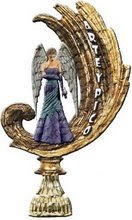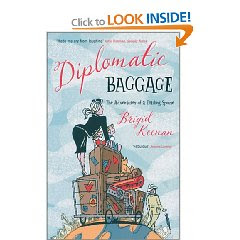This book is about Anna who is a 'designer' baby conceived in the test tube for the specific purpose of providing cord blood to her elder sister Kate, who was diagnosed with Acute Promyelocytic Leukemia (APL) at the age of two. Anna becomes a donor for her sister from the very second that she enters the world. Her entire existence is defined in terms of her sister. When her sister has a relapse she goes on to provide platelets and bone marrow at the age of six. Though Anna has herself never been ill, she has been in and out of hospitals for as long as she can remember. When her sister's kidney fails Anna who is 13, is the only one who can provide Kate with a chance for survival by donating one of her own kidneys. This is the point where she decides to file a suit against her parents for medical emancipation. Anna demands the right to make her own decisions.
The book is told in a first-person account by 7 people -
- Anna/ Androemda - She wants the right to make her own medical decisions and is confused as to whether she wants to donate her kidney or not. She loves her sister and her family, but the lawsuit is tearing apart the family. Besides, the doctors have also said that there is no guarantee that Kate will recover even if she does receive the kidney.
- Kate - She is the one with leukemia and is also Anna's best friend. She is mentally prepared that she is going to die and does not want any more treatment.
- Jesse - Kate & Anna's older brother who only wants some attention from his parents. He is also a troubled juvenile delinquent and supports Anna with her lawsuit.
- Sara - Mother of Jesse, Kate & Anna. In her relentless struggle with Kate's illness, she ends up neglecting Anna & Jesse. Forced to fight on two fronts - Kate's illness and Anna's lawsuit - she is forced to choose between the two when all she wants is that her three children be happy and healthy.
- Brian - Father of Jesse, Kate & Anna and a fireman, he understands very well why Anna has filed this lawsuit. Though he savours every minute spent with Kate, he is mentally prepared for her death and and counsels his wife to also dot he same.
- Campbell Alexander - Anna's lawyer who tries hard to be emotionally distanced from her, but does ultimately get emotionally involved with Anna and her family - seeing how both are right from their own perspective.
- Julia - The guardian appointed by the court for Anna, who also happens to be Campbell's ex-girlfriend.
The book raises many pertinent questions and forces one to think -
From Anna's point of view - At the age of 13, is she old enough to take her own medical decisions, especially when she is not the one who is unwell? Is she obligated to donate a kidney to her sister, when she is well aware that there would be various health related complications and there is no guarantee that this would help Kate recover? Does she have any other importance in her parent's eyes, other than being her sister's keeper? Is she being selfish in demanding this right?
From Kate's point of view - Does she have the right to choose not to receive anymore treatment when she is well aware that there is no guarantee if she will ever recover? Does she feel some form of guilt that her siblings have been knowingly or unknowingly neglected by her parents because of her?
From Jesse's point of view - Since he is not the one who is sick nor the one who can donate any blood or organ, does he have any importance in his parent's eyes? Is he justified in trying to get some attention from his parents?
From the parent's point of view - When one child is so seriously ill, have they been wrong in paying extra attention to her? Were they wrong in conceiving Anna as a genetically designed baby? Are they wrong in asking Anna to donate a kidney when there is the smallest chance that her sister may recover? How do they knowingly choose one child's death?
From Campbell's & Julia point of view - Though they are legally and professionally obligated to only look at Anna's well-being, can they do that by isolating her family from her? Can they morally demand for Anna's emancipation when they well know that this would result in Kate's death? How do they keep their past separate from they current professional relation?
As a lawyer as well I found this book a very interesting read. It raises many questions on the right to life and health, whether a 13 year old (who is a minor in the eyes of law) can demand the right to choose for herself, can the parents be forced to choose between one child and the other, whether the judge made the right decision?
As a human I found myself wondering whether Anna was being immature, what would happen if Anna does refuse to give her kidney, were the parents justified in expecting Anna to donate a kidney.
The book's end is rather unexpected and I shall not give it away in the hope that you all will also read it. One warning, after I finally put the book down I had tears in my eyes, so keep a tissue handy.










